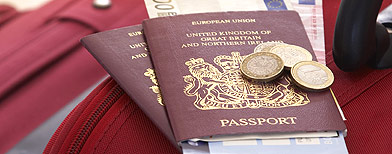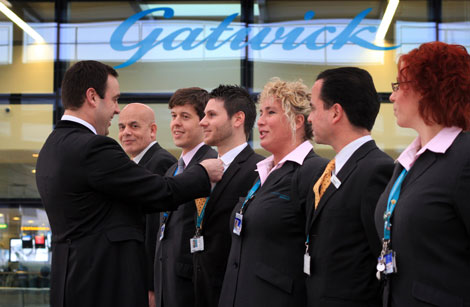Gone are the days when friends or family could kiss passengers goodbye at the gate, replaced by X-rayed shoes and confiscated shampoo bottles at security checkpoints.
Air travelers are increasingly subjected to revealing full-body scans or enhanced pat-downs — all in the name of keeping the skies safe.
As America prepares to mark the 10th anniversary of the worst terrorist attacks in the U.S., security experts question whether freedom, speed and personal space will one day return to air travel — while still maintaining high standards of safety.
Some security analysts foresee a bumper crop of futuristic detection methods — from biometrics to electronic fingerprinting to behavioral analysis — and predict smoother, nimbler and less-intrusive airport walk throughs in the coming years.
Still others envision Big Brother’s even Bigger Brother: chip-embedded passports that someday tell the federal transportation watchdogs all about your daily commutes to work, the mall — even to parties.
Gazing into the future And then there are experts like Ed Daly who peer into the next two decades of public travel and forecast two possible scenarios — breezy yet virtually bomb-proof security checkpoints or, depending on events yet to come, a far harsher reality that includes a welcome-to-the-airport greeting in the vein of: “Please drop your drawers if you want to get on this plane.”
“The future of transportation security will be gathering intelligence technologically while people are moving at the speed of life, not beginning at a point where passengers are queued up, delayed, stripped down and probed,” said Daly, director of intelligence-watch operations for iJet. The Annapolis, Md.-based firm offers risk-management solutions for more than 500 multinational corporations and government organizations.
Daly cites refinements in software that instantly read and catalog everything from faces to license plates and which, he says, must be expanded to airports, trains, subways and public buildings.
“[But] if technology fails to provide an adequate solution, the option in the face of future attacks would be further restrictions and potential for humiliating human-to-human interaction” rivaling a medical checkup, Daly said.
Nearly 500 advanced imaging technology machines, commonly referred to as full-body scanners, are used in 78 airports around the country. About half (247) use backscatter technology, which emits a small dose of X-ray radiation to present a detailed image of the body — and any concealed weapons or contraband a passenger might be carrying. The other scanners (241) are millimeter-wave machines, which use electromagnetic waves that also present a detailed body image.
Despite policies the TSA put in place — agents who inspect the detailed images sit in a room away from scanned passengers, and the TSA’s insistence that the images cannot be stored or shared — many travelers argue the full-body scanners are an invasion of privacy.
In response, the TSA has begun implementing software on the millimeter-wave machines that will highlight dangerous items but will not show detailed, passenger-specific images.
Meanwhile, other critics — including some scientists — claim the scanners are a health risk, and say there hasn’t been sufficient testing to ensure they won’t cause potential harm.
Behavioral questioning The Transportation Security Administration is currently testing behavioral questioning at Boston’s Logan Airport. Behavior detection officers initiate conversations with all passengers passing through Terminal A, asking non-intrusive questions and watching for responses. Fliers who avoid eye contact or who wrestle to answer certain questions may be pulled out of line for extra scrutiny.
The pilot program is “modeled after a number of behavior-detection programs used by other security and law-enforcement agencies, but tailored to TSA’s specific mission,” said TSA spokesperson Greg Soule.
Frequent flier Andrew Schrage argues that this new approach “crosses into people’s (personal) lives.” “That leaves too much up to the subjectivity of the inquirer,” said Schrage, the Chicago-based editor of MoneyCrashers.com, a personal finance blog. He flies about 20 times per year. “It will also act as a further invasion into people’s privacy.” He anticipates that during the next few years airport security will grow “more and more cumbersome.”
Trusted travelers
The “known traveler program” will be tested this fall by the TSA at airports in Dallas, Miami, Atlanta and Detroit. At those hubs, the TSA will tap into the information ticket buyers have already provided the airlines, including their names, dates of birth and gender.
Ultimately, approved “known travelers” will have bar codes stamped on their boarding passes, authorizing TSA screeners to allow those passengers to skip shoe and laptop removals.
"Enhancing identity-based screening is another common sense step in the right direction as we continue to strengthen overall security and improve the passenger experience whenever possible," TSA Administrator John Pistole said in July.
Are we there yet? One long-discussed hybrid of the “known traveler” program is the “Checkpoint of the Future,” a plan to make screening stops quicker and technologically “smarter,” freeing up TSA agents to “scan the crowd, looking for individuals that could pose an outright threat,” said Peter Kant, executive vice president of Rapiscan Systems, a Hawthorne, Calif., company that provides the TSA with passenger-screening equipment, including the backscatter machine.
In June, the International Air Transport Association unveiled a mockup of the idea — three sensor-lined tunnels that divide passengers into high, medium and low risks.
On Aug. 10, the TSA’s Pistole said such checkpoints “would allow you to keep your jacket and shoes on,” although he acknowledged the necessary technology is “not there yet.”
“Specifically, (when and if that machinery is someday implemented), passengers will notice a much more automated and more intuitive process,” said Rapiscan’s Kant. “Annoying divestiture of jackets, liquids and computers will no longer be required. Easy-to-use conveyors and bins will allow for swift scanning of bags






